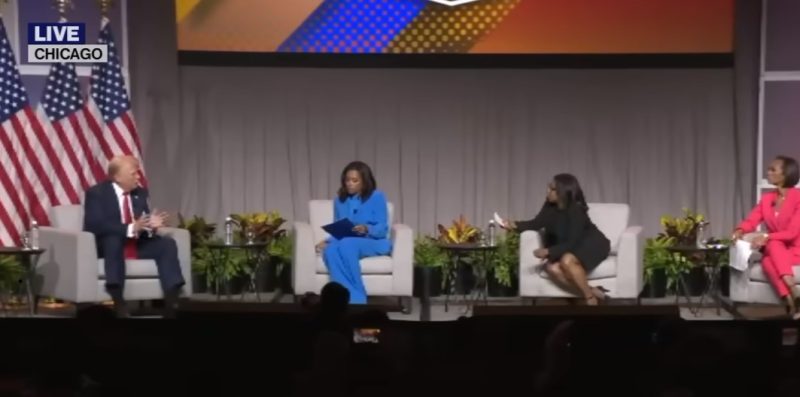
In a controversial appearance at the National Association of Black Journalists (NABJ) convention in Chicago, former President Donald Trump questioned Vice President Kamala Harris’s racial identity, provoking widespread condemnation.
Trump’s comments, which insinuated that Harris is not genuinely Black, were part of a broader attack that has been criticized as both racially insensitive and politically motivated. This is the same playbook Trump tried to use against Barack Obama.
Trump’s Controversial Remarks
The Event and the Comments
During his speech at the NABJ convention, Trump referred to Harris’s mixed heritage in a derogatory manner, questioning her African-American identity because of her Jamaican and Indian parentage. These comments echo past racially charged rhetoric from Trump, targeting Harris’s background to undermine her credibility and appeal among Black voters.
Historical Context of Harris’s Heritage
Kamala Harris was born to a Jamaican father and an Indian mother. Her multicultural background has been a point of pride, symbolizing America’s diversity. Experts in Caribbean and Africana studies have emphasized that Jamaicans have deep African roots, debunking the notion that Harris’s heritage disconnects her from Black identity. Harris has consistently identified as a Black woman and has been actively involved in both Black and Indian communities throughout her life.
Responses from Political Figures and Experts
Kamala Harris’s Response
Harris, maintaining her composure, addressed Trump’s remarks by highlighting her lifelong commitment to civil rights and justice. She emphasized her experience as a prosecutor and a public servant dedicated to fighting for marginalized communities. Her response focused on her qualifications and the substantive issues facing the nation, steering clear of engaging with the derogatory nature of Trump’s comments.
Broader Political Reactions
Trump’s comments have been widely condemned by political leaders, civil rights organizations, and social commentators. Many view his remarks as a deliberate attempt to sow division and exploit racial tensions for political gain. Critics argue that such rhetoric is damaging to the fabric of American society and undermines the progress made towards racial equality.
Implications for the 2024 Election
Impact on Voters
The fallout from Trump’s remarks could have significant implications for the 2024 presidential election. While such comments may bolster his support among certain voter bases, they risk alienating moderate and undecided voters, particularly within the Black community and among those who are sensitive to issues of racial justice.
Harris’s Campaign Strategy
In the face of these attacks, Harris’s strategy appears to be one of resilience and focus on policy. By highlighting her professional achievements and her commitment to justice, Harris aims to present herself as a unifying figure capable of leading the nation through its current challenges.
Conclusion
Trump’s racially charged comments about Kamala Harris at the NABJ convention are a stark reminder of the enduring issues of race and identity in American politics. As the election season progresses, the discourse surrounding these topics will undoubtedly intensify, making it crucial for voters to critically engage with the rhetoric and consider its broader implications for the nation’s future.
